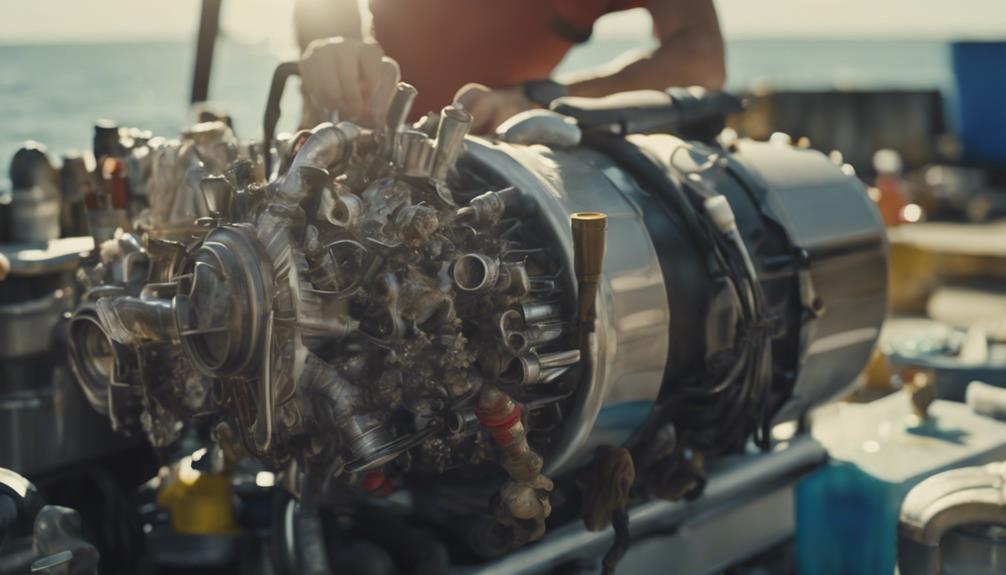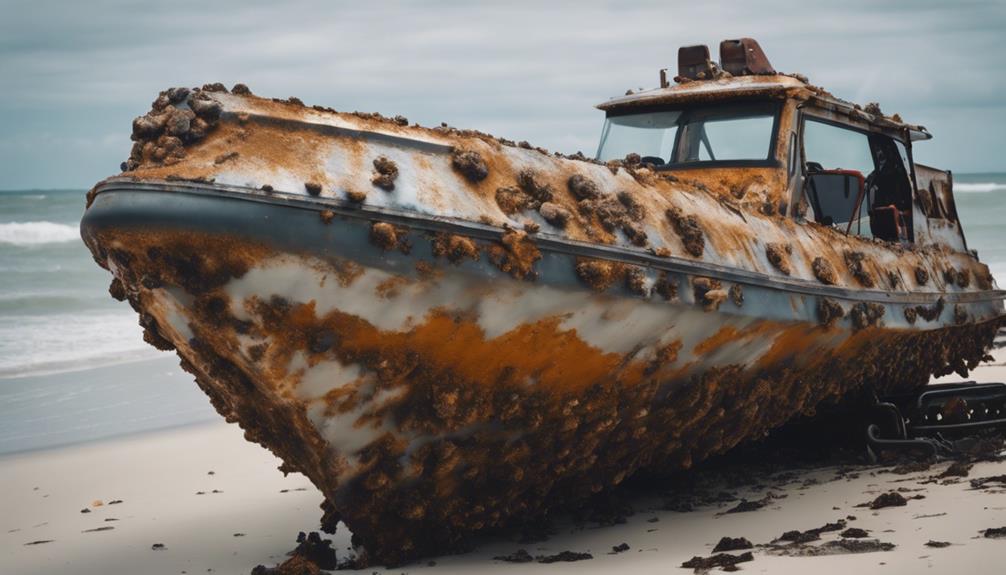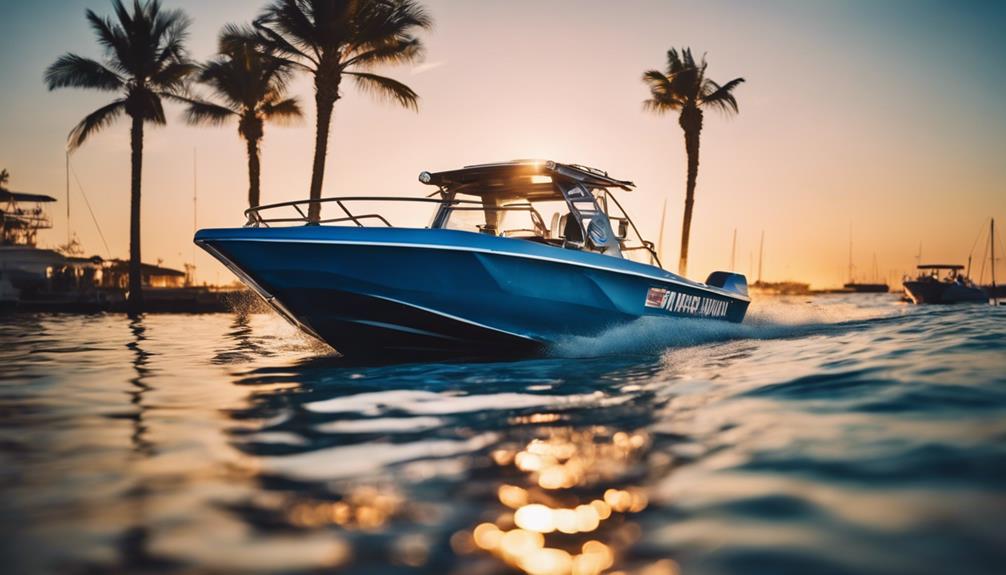You shouldn't leave a jet boat in saltwater for long periods. Prolonged exposure can cause serious corrosion to engine components and damage the hull from marine growth. Ideally, limit exposure to 24 hours, with a maximum of one week. Always rinse your boat with fresh water after each use to remove salt residues and prevent long-term damage. Don't forget to flush the engine and check for corrosion regularly. By following the right maintenance practices, you can extend your jet boat's lifespan. Stick around to find more tips on how to protect your investment and keep your boat running smoothly!
Key Takeaways
- Prolonged exposure to saltwater can lead to corrosion of engine components and structural damage to the hull.
- The maximum recommended exposure duration is one week; ideally, keep it under 24 hours.
- Rinse the jet boat thoroughly with fresh water immediately after saltwater use to prevent salt residue damage.
- Regular maintenance, including flushing the engine and inspecting anodes, is crucial for longevity and performance.
Risks of Saltwater Exposure
Prolonged exposure to saltwater can seriously corrode your jet boat's engine components, making regular maintenance essential to prevent costly repairs. The risks of saltwater exposure aren't just limited to corrosion; they also include marine growth on the hull. If you leave your boat in saltwater for too long, this growth can lead to hull blistering and structural damage.
Moreover, salt crystallization becomes a significant threat when your jet boat is left in saltwater for extended periods. This can severely damage aluminum parts, which are often vulnerable to the harsh effects of salt. Even if you think your boat is safe, untreated saltwater exposure can lead to rusting and deterioration of trailer components, putting your overall safety and performance at risk.
It's vital to limit your jet boat's exposure to saltwater. The recommended maximum duration is one week, with ideal performance achieved by keeping it in saltwater for 24 hours or less. By staying vigilant about these risks, you can save yourself from the headaches and expenses associated with extensive damage to your jet boat.
Maintenance Tips for Jet Boats

Maintaining your jet boat is essential, especially after using it in saltwater.
You need to rinse it thoroughly and flush the engine to protect against corrosion.
Applying a protective coating can also help extend your boat's lifespan in harsh conditions.
Rinsing After Use
After every saltwater adventure, it's crucial to rinse your jet boat thoroughly with fresh water to eliminate salt residues and prevent corrosion. Neglecting this step can lead to costly repairs down the line.
To guarantee your boat stays in top shape, consider the following maintenance tips:
- Flush the Engine: Use specialized products like Salt-Away to effectively neutralize and flush out salt from the engine after each outing.
- Rinse All Components: Make sure to rinse every part of your boat, including the motor, pump, and trailer, to avoid long-term salt damage.
- Regular Cleaning: Mix Dawn dish soap with water to clean shiny parts and create a protective barrier against salt corrosion.
Engine Flushing Techniques
To keep your jet boat running smoothly, it's vital to flush the engine and jet system with fresh water immediately after each saltwater outing. This simple step helps prevent corrosion and salt buildup, which can severely affect your boat's performance.
Use garden-hose attachments for easy flushing of outboard engines; if you don't have one, ear muffs will work too. Make certain all salt residues are thoroughly removed.
Consider incorporating additives like CRC Salt Terminator during the flushing process. These can inhibit corrosion on engine components exposed to saltwater.
Regular maintenance checks are necessary, so don't forget to inspect and replace anodes as needed—ideally yearly or whenever more than half is wasted. This practice helps prevent galvanic corrosion, especially in saltwater environments.
Lastly, schedule routine cooling system inspections to guarantee peak performance and longevity of your jet boat.
Protective Coating Application
Applying a protective coating is crucial for jet boats in saltwater, as it guards against marine growth and corrosion that can compromise performance. Regular application of antifouling paint can help guarantee your boat remains in prime condition.
Here are three key maintenance tips:
- Inspect Regularly: Check your protective coating every few months. Look for signs of wear, especially in areas exposed to saltwater and marine life. Reapply as needed to maintain ideal protection.
- Clean Thoroughly: Before applying any protective coating, confirm all surfaces—including the jet drive and pump—are clean. A thorough cleaning prevents saltwater damage and enhances the effectiveness of the coating.
- Use Specialized Sprays: After each outing, apply a protective spray like Salt-Away to metal components. This neutralizes salt residues and provides an additional layer of protection against corrosion.
Following manufacturer recommendations for protective coatings and maintenance schedules can greatly extend your jet boat's lifespan in saltwater environments.
Engine Care After Saltwater Use

Flushing your engine with freshwater right after using it in saltwater is essential for removing salt residue and preventing corrosion. Saltwater can cause severe damage if left unchecked, so make it a habit to flush out the salt immediately.
Use a quality additive like CRC Salt Terminator during this process; it helps inhibit corrosion and protects your engine components.
Don't forget to regularly check and replace anodes as part of your engine care routine. Monitor them at least once a year or replace them when you notice more than half of the anode is consumed. This will help further protect your engine from saltwater damage.
Lubrication is another critical aspect of maintenance. Be sure to lubricate moving parts with spray grease to help them withstand the harsh effects of saltwater. This simple step can extend the lifespan of your engine components.
Hull and Trailer Considerations

Maintaining the hull and trailer of your jet boat is essential for preventing damage from saltwater exposure. Saltwater can wreak havoc on both, leading to costly repairs and reduced performance.
Here are three key considerations for effective maintenance:
- Hull Protection: Apply a quality bottom coat and anti-fouling paint to your hull to protect against marine growth and corrosion. This can last up to three years if done right.
- Trailer Care: Regularly inspect your trailer components, especially the bearings, as they're prone to corrosion. Cool the bearings before entering saltwater, and use bearing buddies to maintain grease pressure and prevent saltwater intrusion.
- Use Marine-Grade Hardware: Opt for marine-grade hardware for both your hull and trailer. Automotive-grade components might corrode quickly in saltwater, leading to premature failures and increased costs.
Best Practices for Storage

Proper storage of your jet boat plays an essential role in protecting it from the harmful effects of saltwater when it's not in use. As a boat owner, you should store your jet boat in freshwater for extended periods. This minimizes corrosion and damage that's often caused by salt exposure.
Before you store it, use a cover to shield the boat from environmental elements, guaranteeing it stays dry and ventilated to prevent mold growth.
During the winterizing process, focus on regular maintenance. Inspect your boat, especially areas prone to corrosion, like the engine and trailer components. Make sure to remove the battery and store it separately; this will help prolong its life and keep it in good condition.
Lastly, avoid keeping your jet boat moored in saltwater for long stretches. This practice not only reduces maintenance issues but also extends the lifespan of your jet boat.
Community Insights and Experiences

Many boaters swear by rinsing their jet boats with fresh water right after a saltwater outing to keep corrosion at bay. This quick rinse is just one of several protective measures that can help maintain your boat's integrity.
Here are three key insights from the community:
- Regular Maintenance: Consistent engine flushing and jet system care are essential. Neglecting these tasks can lead to long-term damage from saltwater exposure.
- Product Use: Many enthusiasts recommend products like Salt-Away for effective cleaning. Using these can enhance your boat's longevity when operating in saltwater.
- Inspection: Don't forget to inspect aluminum parts and anodes regularly. Boaters have faced significant corrosion issues when these components are overlooked.
Frequently Asked Questions
Is Salt Water Bad for Jet Boats?
Yes, saltwater's corrosive nature can harm your jet boat. If you don't rinse it after each use or limit exposure, you'll risk severe damage to the engine, hull, and crucial components. Regular maintenance is essential.
How Long Can I Leave My Boat in Salt Water?
Leaving your boat in saltwater's like tossing a coin into the ocean—each moment counts. Ideally, you shouldn't exceed 24 hours; anything longer risks corrosion and costly repairs. Rinse it off immediately for the best results.
How Long Can You Leave a Jet Ski in Salt Water?
You shouldn't leave your jet ski in saltwater for more than a week. Ideally, try to limit exposure to 24 hours to prevent corrosion and damage to the engine and hull. Rinse it thoroughly afterward.
What Are the Negatives of a Jet Boat?
Jet boats can face several negatives, including high maintenance costs, susceptibility to corrosion, and potential engine failure. You'll need to invest time and effort to keep it in peak condition and prevent extensive damage.
Is it Safe to Leave a Jet Boat in Saltwater if You Plan to Ski Behind it?
Yes, it is safe to leave a jet boat in saltwater if you plan to ski behind it. However, it is important to rinse the jet boat thoroughly with freshwater after each use to prevent saltwater corrosion. Additionally, it is recommended to use a corrosion-resistant coating to protect the jet boat. Always prioritize safety when you ski behind a jet boat.
Conclusion
So, you're ready to take the plunge and leave your jet boat in saltwater? Just remember, a little care goes a long way.
By rinsing off after each trip and staying on top of maintenance, you can enjoy the thrill of saltwater adventures without the worry.
It's funny how a simple rinse can save you from costly repairs down the road.
Embrace the waves, keep your boat in check, and make unforgettable memories on the water!










